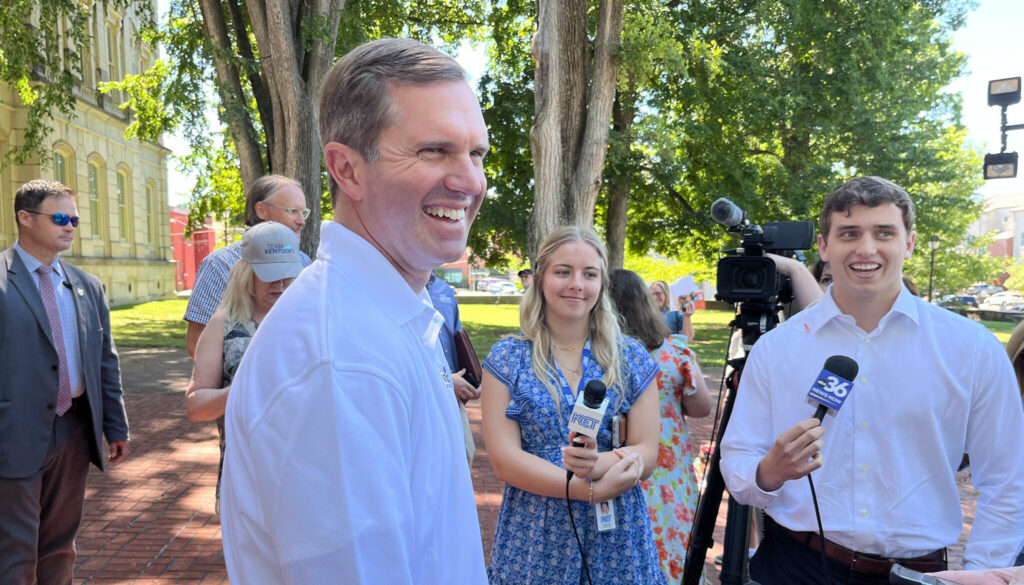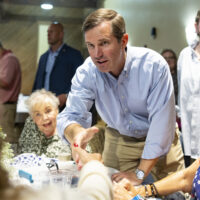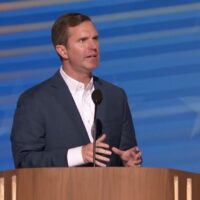Kentucky Gov. Andy Beshear has said he’s keeping his focus on Kentucky for the remainder of his second term following speculation that he could join Vice President Kamala Harris’ ticket. And while he stresses that the spotlight was good for the Commonwealth, some political observers say it was also good for the governor and that his time in national politics likely isn’t over.
Beshear is term-limited in his current office and if he wants to stay in politics, he must look upward.

In a recent interview with the Kentucky Lantern at the Capitol, the 46-year-old governor said he’s “not going anywhere” at the moment when he was asked about his future role in national Democratic politics, such as a cabinet position in a Harris administration should she defeat former Republican President Donald Trump this November.
“I love this job,” Beshear continued, “and even throughout this process, I remember touring Eastern Kentucky for the two-year anniversary of the flood, and looking around, knowing in my heart that this is where I’m supposed to be, that Kentucky is a part of my DNA, and my resolve to get the job done and rebuilding in Eastern Kentucky and in Western Kentucky.”
While Beshear was on Harris’ shortlist for potential running mates, she ultimately chose Minnesota Gov. Tim Walz.
Stephen Voss, a political science professor at the University of Kentucky, said he wouldn’t “read too much” into signals Beshear may send through state media outlets right now about his prospects in a possible Harris administration. Through the running mate speculation, he had direct contact with her campaign and was auditioning to become her running mate through press coverage at the time.
“He did in his answer stick to the focus on Kentucky theme,” Voss said. “That’s really not that different from what he was saying initially when asked about his openness to the vice presidency.”
Voss likened “Beshear’s current disavowal of national ambitions” to answers he gave during Harris’ running mate selection process. When asked if he would like to join Harris’ ticket in a late July MSNBC interview, Beshear said the “only way I would consider something other than this current job is if I believed I could further help my people and to help this country.”
As a relatively young politician, Democratic strategist Will Carle said “the sky is the limit” for Beshear’s future career. Carle predicted Beshear could be considered for a cabinet position within a possible Harris administration but added that Beshear could be a viable candidate for a U.S. Senate seat.
“He’ll be part of the next generation of leaders for the national party no matter what he does — even if he doesn’t go right back into electoral politics or a cabinet position,” Carle said. “But his success in our state really demonstrates that he has the ability to connect with voters that normally have not been aligning with Democrats, and that’s going to be something that will be incredibly valuable to the national party as we move forward into the midterms.”
Tres Watson, a former spokesperson for the Republican Party of Kentucky, said Beshear would probably consider a cabinet position to move into federal politics if Harris wins. Otherwise, Beshear must figure out a way to stay relevant if he wants to campaign for national office in 2028, Watson said.
Beshear said in the Lantern interview that the national attention on him was a positive for Kentucky, and hoped that it would give the state “a seat on the national stage, whether that’s the ability to be in the room with those that are going to make decisions on grants, or the ability to talk about an issue that’s very important — and maybe even particular to Kentucky — and hopefully get positive movement or change related to it.”
Watson disagreed with the governor’s notion that the speculation had benefits for Kentucky. Watson added that he gave props to Beshear’s team because “they took someone who really, realistically, had no actual shot at getting the vice presidential nomination” and put him “into the conversation and raise his profile nationally.”
Carle acknowledged that the national attention on Beshear shone a “big light on the great work that he’s done” in terms of economic development, supporting public education and expanding health care, but thought the governor was right it saying it could help Kentucky recruit businesses and added that it also could persuade prospective college students to consider Kentucky.
“These are priority wins that people from around the country will get to see — that Kentucky is a welcoming place, that we care about our people, and that we’re an economy on the move,” Carle said. “So it puts us in a place where we’re an emerging state, and Gov. Besher being able to be on the national stage like that just highlights the kind of leaders we also elect here, or at least some of them.”
Carle added that he does believe the speculation around Beshear will give Kentucky Democrats a boost heading into November elections. Democrats, including Beshear, are rallying against a Republican-backed constitutional amendment that would allow the General Assembly to fund nonpublic schools. Additionally, Kentucky voters will decide legislative races around the state.
Two candidates Carle is working for had fundraising events during Harris’ running mate vetting process with “overwhelmingly large crowds” and he credited the speculation around Beshear to that.
The governor and the General Assembly
Beshear told the Lantern he wants to “lay the groundwork for more important changes we need” such as raising pay for educators and implementing universal pre-K. Those have been issues the governor has long called for and included in the budget proposal he submitted to the Republican-controlled General Assembly this year.
The governor and Republicans in the legislature have a “fundamental disagreement” about how to raise teacher pay, Watson said. In response to Beshear on raising teacher salaries, Republican lawmakers pushed for salary changes through Kentucky’s Support Education Excellence in Kentucky (SEEK) formula and to for them to be determined by local school boards and superintendents. The governor called for direct raises.
Watson said Republican lawmakers allocated extra funding toward one-time projects, such as infrastructure or water projects, rather than recurring cost like teacher raises or universal Pre-K.
He added the governor and Republican lawmakers can work together when Beshear “comes to the table with an idea that is realistically something that Republican legislators would be interested in,” such as investing in economic projects like manufacturing plants for vehicle batteries. However, Beshear “tends to push things that are ‘pie in the sky’” that won’t gain support with Republican lawmakers and can say on the campaign trail “‘Look at these things I promised you that Republicans wouldn’t give you,’” Watson said.
“It’s disingenuous. Republicans in the legislature are very frustrated by it, and I don’t see that changing,” Watson said. “You’re talking about changing ingrained behavior in three years. That’s probably not going to happen.
To implement his priority policies, Beshear will have to “take it to the court of public opinion,” Carle said. Beshear has long supported public educators and families who need child care and want to get a head start on education, Carle added.
“I think if the governor makes a compelling case — which he often does — there will be pressure on the legislature to start to enact some of the policies that we know invigorate economies, that create safer, stronger, healthier communities and that provide relief for parents and give their children an opportunity so that they can compete in a world where education will be the deciding factor on how far they go in life,” Carle said.
If Beshear wants to have policy influence for the remainder of his term as governor, it could mirror the actions of his father, former Gov. Steve Beshear, Voss said. That would include taking advantage of the legislature not being in session most of the year and using the discretionary influence of the governor’s office.
Voss said the odds that Beshear could turn a new tide in his relationship with Republican legislative leadership is “pretty small,” and pointed to GOP criticism of Beshear during the Harris’ running mate consideration process. After Walz was selected, the Republican Party of Kentucky issued a statement saying it was “no surprise Kamala Harris took a pass on Andy. His years of controversy and lack of policy wins made choosing him a liability.”
While some Republicans might have been excited about the possibility of Kentucky’s highest ranking Democrat leaving the state, Voss said, Republicans added to the criticism of Beshear, which shows “that the bad blood runs a little too deep.”
This article is republished under a Creative Commons license from Kentucky Lantern, which is part of States Newsroom, a network of news bureaus supported by grants and a coalition of donors as a 501c(3) public charity. Kentucky Lantern maintains editorial independence. Contact Editor Jamie Lucke for questions: info@kentuckylantern.com. Follow Kentucky Lantern on Facebook and Twitter.
McKenna Horsley covers state politics for the Kentucky Lantern. She previously worked for newspapers in Huntington, West Virginia, and Frankfort, Kentucky. She is from northeastern Kentucky.






